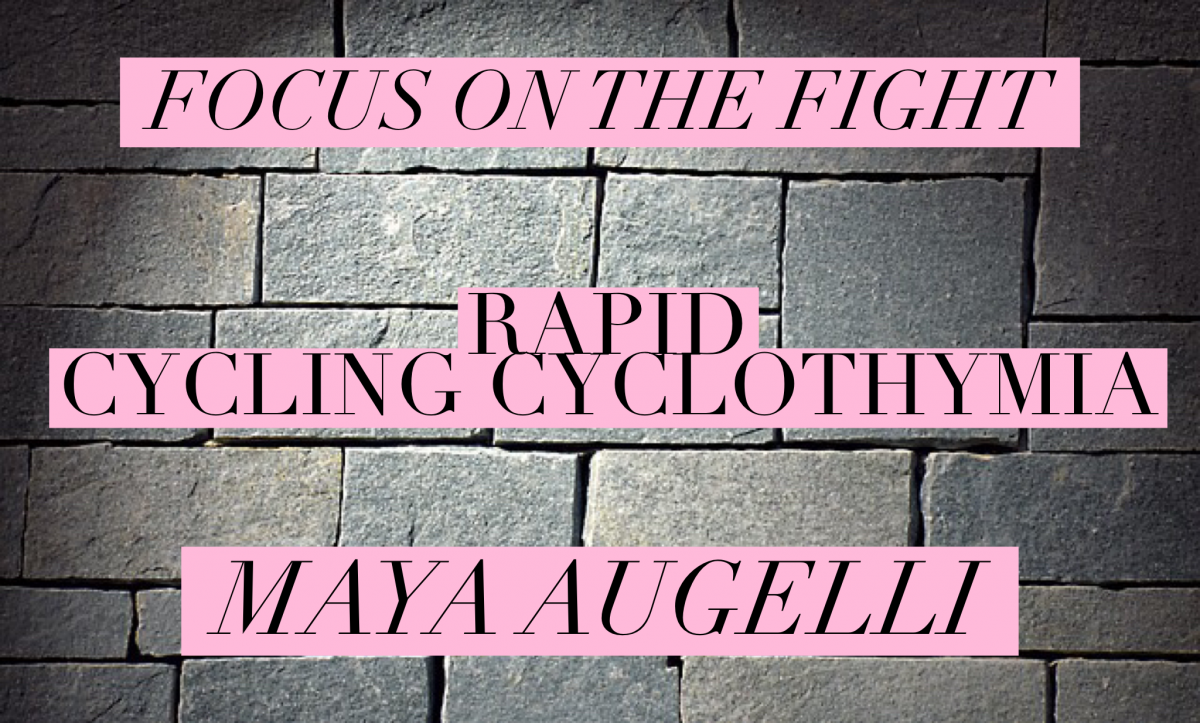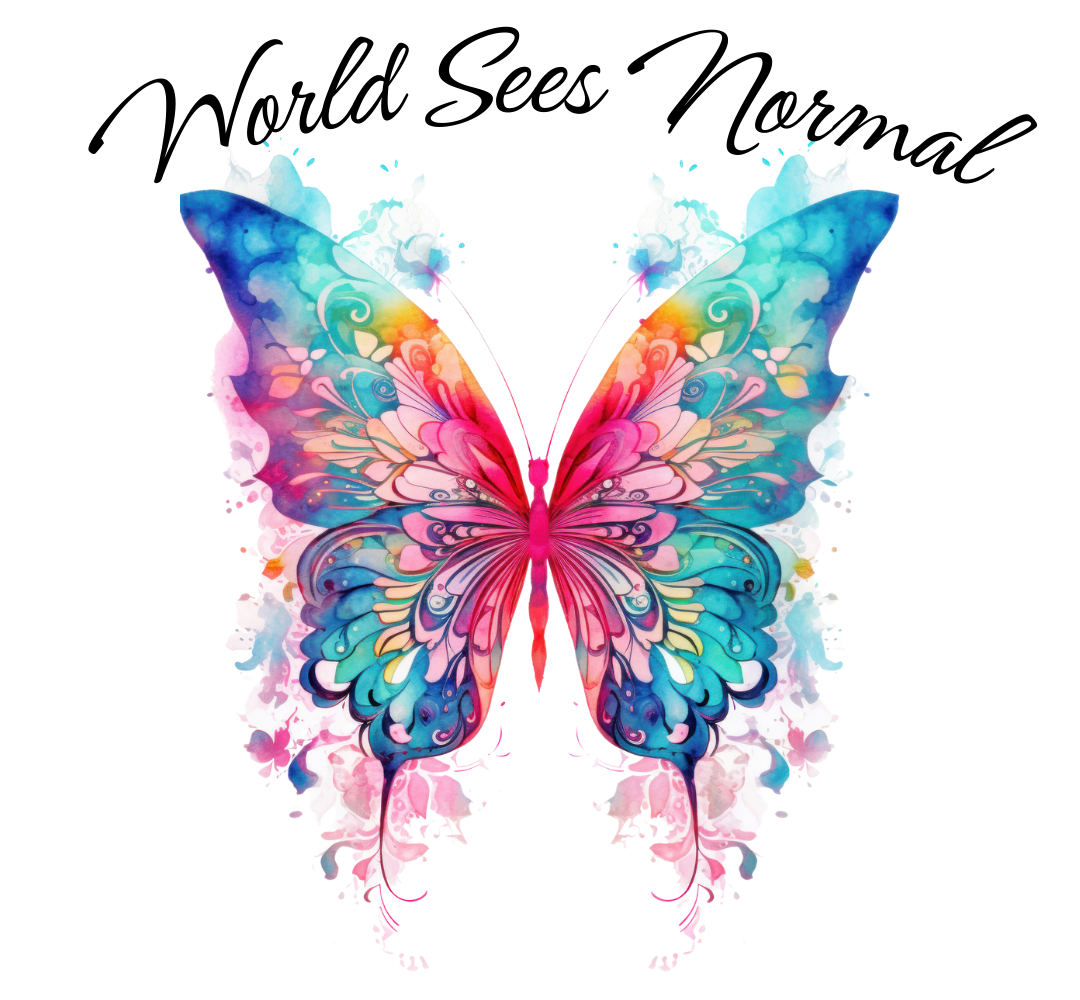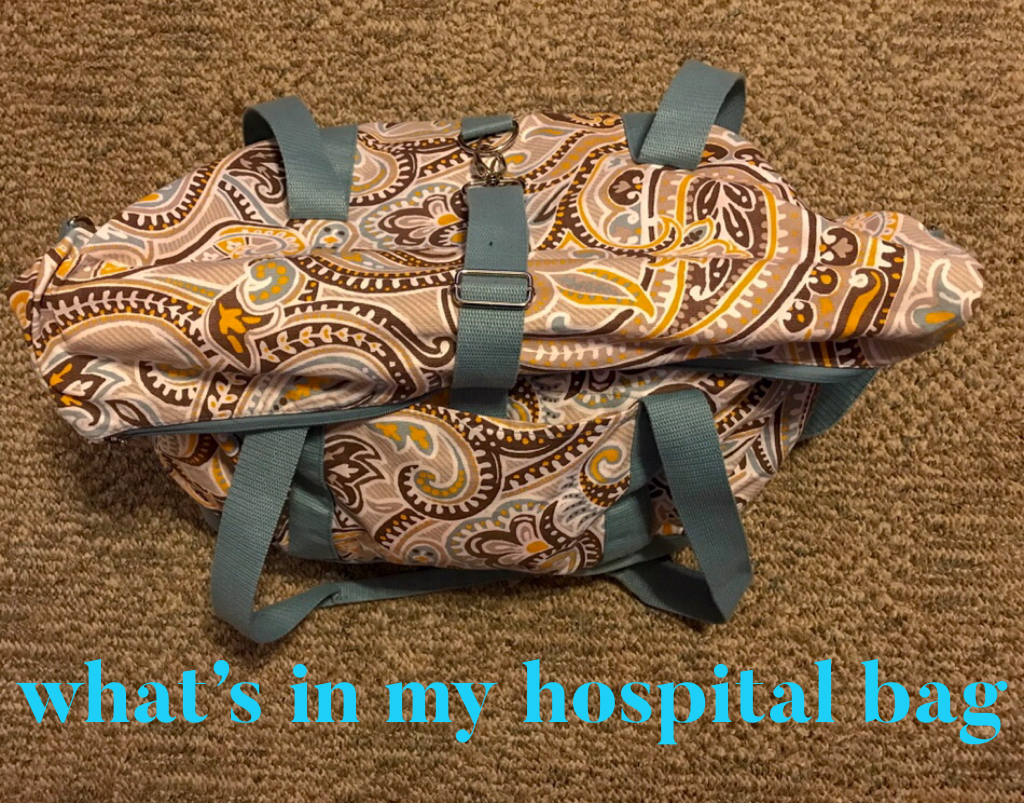Welcome to Focus On The Fight, a series of interviews that will be posted every Friday, focusing on a blogger and their health.
This week we will meet Maya Augelli. She has a multitude of chronic condition including the condition we will highlight this week: Rapid Cycling Cyclothymia.
Maya is currently 39 years old and lives in Philadelphia with her husband and dog. Her current big project, besides advocacy of course, is that she is enrolled in Yoga Teacher Training, and should (fingers crossed) be a certified yoga teacher by early May 2019! She has been diagnosed with Rapid Cycling Cyclothymia (mood cycling disorder), migraines, and IBS
What is Rapid Cycling Cyclothymia?
Cyclothymia is a rare mood disorder that has characteristics that are similar to bipolar disorder, just in a milder and more chronic form. When you have Cyclothymia you experience cyclic highs and lows persistently for two years or more. Those who have this disorder experience a milder low, and mild depression and not characteristic of a full major depression. On the other end of things the highs are classified as symptomatic hypomania, a less severe form of mania. During the high times your moods will elevate for a time before returning to the baseline. And during the lows you feel mildly depressed. In between you are likely to feel like yourself!
Symptoms:
The American Psychiatric Association states that to be diagnosed with cyclothymia, you must meet all of the following:
- Multiple periods of hypomanic symptoms that do not meet criteria for a hypomanic episode and multiple periods of depressive symptoms that do not meet criteria for a major depressive episode for at least two years (one year for children and adolescents)
- Throughout the two year (one for children and adolescents) time frame, symptoms of hypomania and depression have been present for at least half the time, with no more than two consecutive months showing no symptoms
- Criteria for a major depressive episode, manic episode, or hypomanic episode have never been met
•Other mental disorders (e.g., schizoaffective disorder, schizophrenia, delusional disorder) have been ruled as the contributing factor to hypomanic and depressive symptoms - Hypomanic and depressive symptoms are not related to medications, substance abuse, or other medical conditions
- Hypomanic and depressive symptoms cause significant disruption in social, occupational, or other functional areas
Now that we all know a little bit about Maya and the condition she lives with I would like to share the entirety of Maya’s interview.
How long did it take you to get diagnosed? Now that you have been diagnosed and can look back at your past, is there an event that you can pinpoint as a flare now that at the time you didn’t know what it was?
I’ll answer for cyclothymia, since I mostly do mental health advocacy. It took me almost 30 years to get diagnosed. I’m told I was most likely born with my condition, and looking back, I started exhibiting symptoms as early as two years old. Through my early childhood, I used to have episodes of what I now know was most likely hypomania, and used to beg my parents to “make it stop”, though I couldn’t put the words to what “it” was at the time. These types of “episodes”, for lack of a better word, continued throughout my youth, though naturally with age, the way I reacted to them changed. I finally was diagnosed, after years of going to therapist after therapist with no answer, a few weeks shy of my 30th birthday.
Tell us about how your illness(es) impacts your daily life!
I like to say that every day of my life is a surprise. Because my condition is rapid cycling, I can cycle anywhere from every couple of weeks to every couple of hours. So I can go to bed feeling fine, wake horribly depressed, be hypomanic by lunch time, back to depression by dinner. This type of super rapid cycling is rare for me, but it has happened. So I have had to learn to live every day in a “be prepared for anything”, (at least mood wise) way more or less. The cycling can drastically affect my ability to focus and get work done, can cause a complete loss of physical and mental energy, emotions can hit hard when I’m least expecting them. I’ve had to become as comfortable as possible with the fact that my brain isn’t always the most dependable, and so I work hard at making the rest of my life as reliable and stable as possible, to be able to support me when I begin to cycle badly.
Have you noticed that your health has impacted any of your current or previous relationships!? If so, how?
Absolutely. I think it’s nearly impossible for it not to. My mood cycles are unpredictable even to me, so naturally they will be more so for those close to me. I also think it can beeasy for me to take my frustration and pain from my condition out on those closest to me, to look for external “solutions” or blame external situations when really, there’s nobody to blame – I have an illness, and at times, it gets really bad. It’s a daily and continual effort of mine to take accountability for the pieces I can (like knowing when it’s my illness and not someone else’s fault), while not blaming myself for being ill, and hoping that I can treat those around me as best as possible, even when I’m cycling badly. I’m not always the most successful at it, but life’s a work in progress, right?
In what way has your life changed since your diagnosis? Is there anything that you cannot do now that you could do before diagnosis?
In so many ways, honestly. First off, once I had a diagnosis, I was able to begin a treatment plan. That was huge. Before, it was just grasping at straws hoping I found something that made me feel better. It also led me to learning in depth about my condition, so that it’s now easier to notice when I feel a cycle starting to come on. I’m not always accurate – the times I wake up in depression, for instance, are near impossible to predict since I’m sleeping when the cycle hits – but it does help. It also helps me to name them. I can remind myself “this is a depressive cycle, it will pass”. it doesn’t make the feeling any better in the moment, but I’m sometimes able to remind myself to just hang on, not make any massive decisions while in this state, and get through it as best I can. Being diagnosed also led me blogging about my life with cyclothymia, and then speaking about it social media, and it’s opened up a the world of advocacy to me, which is been amazing. I’ve met so many incredible people in the advocacy world. As for things I can’t do now, I wouldn’t say there are things I can’t do as a general rule, but I have made lifestyle changes to help – like trying to get more sleep and focusing more on self-care for instance.
Everyone’s disease will act different, for you how do you know you are having a flare?
It depends on which way I’m cycling. I often describe a hypomanic cycle like drinking a whole pot of coffee on an empty stomach and then trying to go about your day and focus, concentrate, get things done like you normally would. Everyone experiences hypomania differently. I don’t have any of that “euphoric” type feeling so often described – I just feel like I’m over-caffeinated, anxious, and my brain won’t stop running. Depressive cycles are a bit trickier to figure out – unless it’s one where I wake up crying for “no reason” – because it can show up in different ways for me. Sometimes, it’s extreme sadness, sometimes it’s “nothingness” – I struggle to feel anything at all. Sometimes it’s feeling anger or frustration or hurt that I can’t place. Plus, it can be tough at times to distinguish the start of a depressive cycle from something that would make anyone (i.e. someone without a mood disorder) feel badly – lack of sleep or good nutrition, a bad week at work, a relationship struggle, etc. So when it comes to depression, I often have to dig a little deeper to tell if I’m having a flare. Many times, it’s the nothingness that cues me in. I’m a person that’s generally very passionate about life and everything in it, so if I’m feeling like I just can’t care about anything, that’s usually a sign that I’m in a depressive cycle.
What do you do to treat your flares? Or to make your bad days better?
It depends on the flare. I try to focus on maintaining as much stability in my environment as I can, to counteract what feels like the lack of control over my moods/brain. I maintain routines as best I can, I practice extra self care, I try to surround myself with support and love, and remind myself to go easy on myself. It’s easy to feel badly about feeling badly, but I try to remind myself that I have an illness, that it’s flaring, and that I don’t need to be so hard on myself. I often remind myself to treat myself the way I would treat a close friend or loved one if they were going through this same thing. That helps. Also I regularly go to therapy – not only when I flare, but having a regular therapy schedule means that when I do flare, I’m likely to have an appointment close in time, which can be a huge relief.
In closing I asked Maya two last questions. I asked her what advice she would give to someone who is going through the diagnosis process or is newly diagnosed. As well as what she would want the world to know about living with a chronic illness. Here is what she said.
-Surround yourself with love and support, and take it day by day. Or if you have to, hour by hour. There may be times when your biggest accomplishments are things like getting out of bed, or showering, or interacting with your partner/family. That’s OK. Appreciate the seemingly small accomplishments as much as the big ones. Many days, those seemingly small things are what get you through, and getting through IS big.
-That we are human beings, first and foremost. Just like people that don’t live with chronic illness. This means that our dreams and hopes and ideas and goals and desires are just as valid. It also means we’re as fun, as interesting (and interested) as quirky, as fallible, as flawed, as deserving, as worthy and overall, as human, as every other person.
I would like to thank Maya for sharing her story with us. She has such a passion for sharing her condition and providing education to others about what she lives with.
Where You Can Find Maya
With Love,
Amber



